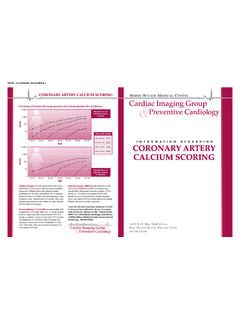Transcription of Abortion restrictions put women’s health, safety and well ...
1 Abortion in the United States is an extremely safe procedure. restrictions imposed in some states are not based on medical evidence and will do nothing to improve women s health and safety . In fact, these requirements put women at risk by standing in the way of safe reproductive care. In 2016, the US Supreme Court will review a Texas law that imposes multiple Abortion restrictions . The main provisions of the law require Abortion providers to obtain hospital admitting privileges and meet building specifications to become an ambulatory surgical center (ASC) essentially a mini-hospital. Decades of research show that Abortion is a common and safe medical procedure that one in three US women obtain.
2 Evidence proves that laws restricting access to Abortion care do not improve its safety and actually put women s health at risk. Abortion is a safe medical procedure The safety of Abortion in the US is extensively documented. The most comprehensive study found that Abortion is very safe: Major complications are rare, occurring in lessthan of one percent of procedures,1 which issafer than having wisdom teeth removed. Abortions performed in a variety of clinicalsettings including doctors offices, clinics andhospitals are this safety record, there is no medical evidence to support the need for admitting privileges or ASC ,3 In fact, many medical procedures riskier than Abortion are offered outside of ASCs by providers without admitting Compromising women s health & well-being After Texas enacted some parts of its law in 2013, the number of facilities providing Abortion care decreased by almost Research shows that women now report multiple barriers to obtaining safe Abortion care, including increased travel time.
3 Longer waits for an appointment and greater Abortion restrictions put women s health, safety and well-being at risk Delaying or effectively blocking Abortion care puts women s health at risk. When a woman has no option but to obtain an Abortion later in pregnancy, major complications are more likely and costs are Additionally, research shows that carrying an unwanted pregnancy to term is more dangerous to a woman s health than Research also shows that Abortion does not negatively impact a woman s well-being. Contrary to some claims, Abortion does not place women at risk for post-traumatic stress disorder, depression, low self-esteem or anxiety, nor does it increase drug, tobacco or alcohol Over 95% of women report that Abortion was the right decision for One year later, women who obtained Abortion care were more likely to have a positive outlook on life than women denied this Abortion restrictions may put a woman s physical and emotional safety at risk.
4 Limited Abortion access may result in more women being unable to terminate unwanted pregnancies, keeping them in contact with violent partners. This puts both women and their children at increased risk of A significant burden on women Unnecessary Abortion restrictions place a burden on women and result in unequal access. A study in Louisiana found the state s admitting privileges law would result in widespread clinic closures, more than tripling the average distance traveled for Abortion care from 58 to 208 The expense of Abortion care is already very high for some women; these types of restrictions may unfairly make it accessible to only the Limited access to Abortion makes it likely that self-induction will become more common.
5 Misoprostol is a medically safe way to self-induce Abortion , but it is not readily available in the United States. Women are turning to less effective and more dangerous methods including taking herbs and inflicting abdominal Conclusion Extensive medical, epidemiological, psychological and sociological evidence proves that Abortion is safe for women. Research shows that current laws claiming to improve the safety of this common medical procedure are more likely to harm women. 1. Upadhyay UD, et al. Incidence of emergency department visits andcomplications after Abortion . Obstet Gynecol 2015;125 White K, et al. Complications from 1st-trimester aspiration Abortion :systematic review of the literature.
6 Contraception 2015;92 of Amicus Curiae. ACOG and AMA. Washington, DC, Castro G, et al. Outpatient colonoscopy complications in the CDC'sColorectal Cancer Screening Demonstration Program: aprospective analysis. Cancer 2013;19 Grossman D, et al. Change in Abortion services after implemen-tation of a restrictive law in Texas. Contraception 2014;90 Fuentes L, et al. Women's experiences seeking Abortion careshortly after the closure of clinics due to a restrictive law in 2016; e-pub ahead of Gerdts C, et al. Side effects, physical health consequences, andmortality associated with Abortion and birth after an unwantedpregnancy. Women s Health Issues 2016;26 Biggs MA, et al.
7 Does Abortion increase women's risk for post-traumatic stress? Findings from a prospective longitudinal cohortstudy. BMJ Open 2016;6 Biggs MA, et al. Does Abortion reduce self-esteem and lifesatisfaction? Qual Life Res 2014;23 Foster DG, et al. A comparison of depression and anxiety symptomtrajectories between women who had an Abortion and womendenied one. Psychol Med 2015;45 Roberts SC , et al. Receiving versus being denied an Abortion andsubsequent drug use. Drug Alcohol Depend 2014;134:63-7012. Roberts SC, et al. Receiving versus being denied an Abortion andsubsequent tobacco use. Matern Child Health J 2015;19 Roberts SC, et al. Receiving versus being denied a pregnancytermination and subsequent alcohol use: A longitudinal Alcohol 2015;50 Rocca CH, et al.
8 Decision rightness and emotional responses toabortion in the United States: A longitudinal study. PLOS One2015;10:e0128832. 15. Upadhyay U, et al. The effect of Abortion on having and achievingaspirational one-year plans. BMC Women s Health 2015;15 Roberts SC, et al. Risk of violence from the man involved in thepregnancy after receiving or being denied an Abortion . BMCM edicine 2014;12:144. 17. Roberts SC, et al. Implications for women of Louisiana's lawrequiring Abortion providers to have hospital admitting 2015;91 Roberts SC, et al. Out-of-pocket costs and insurance coverage forabortion in the US. Women s Health Issues 2014;24 Grossman D, et al. The public health threat of anti-abortionlegislation.
9 Contraception 2014;89(2):73-4.









